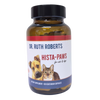We know that carrots are great for our eyes because they're packed with vitamin A, which helps maintain clear vision, especially in low light. But vitamin A has other amazing benefits too, particularly for skin health. Retinol, a compound derived from vitamin A, is widely used in skincare for its ability to smooth wrinkles, improve texture, and boost cell turnover.
With increasing awareness of the importance of vitamin A-rich foods in our diets, it’s natural to wonder if our dogs can benefit too. The answer is yes! Vitamin A is crucial for dogs' eyesight, skin health, immune system, and overall growth and development.
In this article, we'll dive into how vitamin A works and its benefits for your canine companions.
Vitamin A for Your Dog's Eye
Both dogs and humans need vitamin A for healthy vision, but their visual experiences differ due to variations in their retinas. The retina contains rods and cones, with rods aiding low-light and motion detection, and cones handling bright light and color perception.
Humans have more cones for sharper vision and better color distinction, while dogs have more rods, enhancing night vision and motion detection. Retinol or vitamin A transforms into 11-cis retinal in the retina cells, which combines with rhodopsin to create a pigment essential for low-light vision. Adequate vitamin A ensures healthy levels of rhodopsin, crucial for good vision.
Vitamin A also maintains overall eye health, enhances low-light vision, improves daytime color perception and clarity, and helps maintain a clear cornea for sharp images.
How Vitamin A Will Help Your Dog's Skin and Coat
Vitamin A has been successfully used to treat Seborrhea in American Cocker Spaniels, and topical treatments have been used for several skin conditions in various breeds. Additionally, it has been shown to be beneficial in patients with marked follicular plugging and hyperkeratosis [1]. This vitamin also super important for keeping dogs' skin and fur healthy in several ways:

Vitamin A for Your Dog's Immune Function
Many of us are aware of how vitamin A benefits vision and skin health in dogs. However, what often goes unnoticed is its critical role in boosting their immune function. Here’s how it works.
- Retinol maintains mucosal surfaces in the respiratory and gastrointestinal tracts, which act as barriers against pathogens. It supports mucus production and other protective elements to strengthen these barriers.
- Retinol is vital for the development and function of T cells and B cells. T cells attack infected cells, while B cells produce antibodies. Retinol helps mature these cells, enhancing immune responses.
- Retinol aids in the development and function of white blood cells, such as neutrophils, macrophages, and natural killer cells, improving their ability to identify and eliminate pathogens.
Vitamin A for Dogs Reproductive Health
Vitamin A plays a crucial role in the reproductive processes of dogs through several mechanisms. Firstly, it supports the development and maturation of reproductive tissues such as the ovaries in females and testes in males. This is important for the proper functioning of these organs in producing eggs and sperm, respectively.
In males, retinol is involved in spermatogenesis, which is the process of sperm cell production. It helps in the formation and maturation of healthy sperm cells, ensuring they're healthy and able to fertilize eggs.. On the other hand, in females, retinol contributes to folliculogenesis, which is the development of ovarian follicles that contain eggs. Proper follicle development is crucial for their reproductive health and ability to become pregnant.
The Best Way to Give Vitamin A to Dogs
The Association of American Feed Control Officials (AAFCO) advises that adult dog food should contain 5000 IU of Vitamin A per kilogram. Vitamin A comes in two forms: retinol from animals and beta-carotene from plants. Retinol is great because it easily turns into active vitamin A in their bodies. Some commercial pet food uses this type of vitamin A because they use meat, such as chicken or beef, as a protein source.
However, eating only commercial dog food might not give your pet all the vitamins they need. So, it's a good idea to add some extra vitamin A to your dog's diet instead of relying solely on commercial pet food. The best way to make sure our dogs get enough vitamin A is by balancing their diet like The CrockPet Diet and adding supplements.
It's important to note that dogs and cats have inconsistent and often limited abilities to convert certain plant carotenoids like β-carotene into vitamin A. This differs from many other animals, such as poultry, livestock, and most wild animals, which can efficiently convert these compounds. Therefore, providing vitamin A supplements can be a good solution to ensure dogs and cats receive adequate amounts of this essential nutrient.
Final Thought
Incorporating foods rich in vitamin A into their diet and considering supplements when necessary can lead to healthier skin, a stronger immune system, and overall better health for our furry friends.
While dogs can tolerate higher vitamin A levels than humans, it's important to administer the correct dosage to avoid potential toxicity issues. It's always wise to seek advice from a veterinarian or a certified Holistic Pet Health Coach to ensure your dog receives the right amount of vitamin A based on their individual needs and health condition.
Reference
[1] Sousa C.A. Nutritional therapy in veterinary dermatology; Proceedings of the Proc AVMA Convention; Baltimore, MD, USA. 25 July 1998; pp. 713–715. [Google Scholar] [Ref list]
[2] Codner E., Thatcher C. Nutritional management of skin disease. Compendium. 1993;15:411–423. [Google Scholar] [Ref list]
[3] Green, A.S.; Fascetti, A.J. Meeting the vitamin A requirement: The efficacy and importance of β-carotene in animal species. Sci. World J. 2016, 2016, 7393620. [Google Scholar] [CrossRef]
















